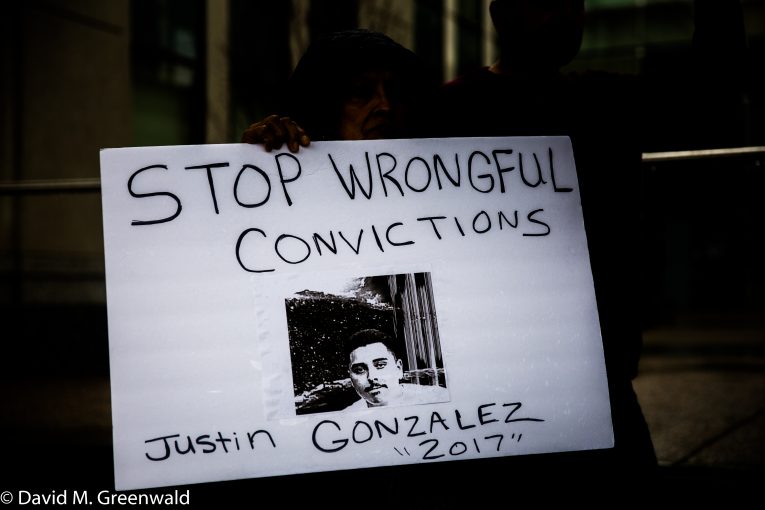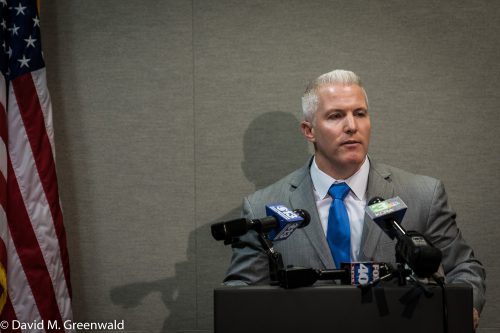

There was an interesting article in The Nation Magazine last week entitled: “Why Does Our Justice System Fight So Hard to Keep Innocent People Behind Bars?” The article focused on the work of Mark Godsey, who was a “prosecutor’s prosecutor,” one “who didn’t think there were any innocent people in prison. Then he began supervising his law school’s Innocence Project, and realized his assumptions were all wrong.”
The question it asks is incredibly important because, as many people have observed, the system has flaws that make it plausible, even relatively easy, to put innocent people in prison, but makes it next to impossible to get them out once they are there.
But prosecutors can actually play a huge role in correcting the flaws in the system – if they are willing to acknowledge the possibility that they are flawed.
Across the nation, the criminal justice reform movement, coupled with the work of the Innocence Project, has focused the attention of many on the point that there are far more people in prison who are innocent than we ever wanted to acknowledge.
That has led to a number of district attorney’s offices setting up Conviction Review Units or Conviction Integrity Units to review cases post-conviction.
Some have been lip service at best, others have been game-changers. Mr. Godsey cites two in particular, Brooklyn and Houston, as being models for success.
In his book, which I highly recommend, Blind Injustice, he notes, “The Conviction Review Unit in Brooklyn District Attorney’s office exonerated twenty inmates in the first two years of its 
operation.”
In Houston, prosecutors freed 42 inmates in 2015 alone, on the grounds of innocence. Professor Godsey notes, “No law school innocence organization, including my own, can come close to matching those numbers.”
According to his book, the Conviction Integrity Units in Brooklyn and Houston combined to exonerate, in 2015, 58 of the 149 exonerations in this country. That’s just two units.
So are we to take it that Brooklyn and Houston are just worse than everywhere else in the country in terms of locking up innocent people, or is it more reasonable to conclude that the other counties are simply not doing their due diligence when it comes to investigating and freeing up innocent people?
Professor Godsey’s conclusion is obvious.
He writes: “The CIUs in Brooklyn and Houston are, of course, a welcome and much-needed addition to the innocence movement. Combined with independent innocence organizations like my Ohio Innocence Project, they provide a blueprint for how we can eventually conquer the problem of wrongful convictions.
“But the failings of CIUs in other jurisdictions show that success in this area is hard to attain. Many of the other CIUs thus far appear to pay little more than lip service to the problem of wrongful convictions, because the prosecutors in charge seem understandably unable to move past their own psychological barriers to adequately reexamine old cases with a fresh eye.”
In 2014, Yolo County followed the national pattern of creating a Conviction Integrity Unit. At the time, the Vanguard and other critics were skeptical that it would amount to anything and, to our knowledge, the Conviction Integrity Unit has never played any sort of a role in reversing a conviction.
At the time, DA Jeff Reisig stated in a press release: “A prosecutor’s role is to ensure that our system achieves justice which includes not only convicting the guilty but also guaranteeing the protection of the innocent. The creation of this Unit helps us to obtain both of these goals.”
As the office explained, “This unit will be headed by an Assistant Chief Deputy District Attorney to review all claims of factual innocence made by persons who have been convicted of crimes.“
The release went on to explain how the process would work: “The Unit will conduct an initial inquiry to determine whether further review or investigation is necessary. The Unit will review transcripts, evaluate forensic evidence in light of new scientific knowledge, conduct additional forensic tests, interview witnesses, or conduct any other investigation deemed necessary. This Conviction Integrity process supplements the appellate process already available to defendants and is designed to avoid the possibility of an innocent person being punished for a crime they did not commit.”
So how is Yolo County doing? Not well.
The Vanguard made a records request for what the Yolo County DA’s Conviction Integrity Unit has achieved since it was launched, with some fanfare, in 2014. The results are discouraging, even for our modest expectations.
According to the county, they have reviewed just six cases and forwarded none of those to a second level review.
As Mark Godsey himself pointed out in a conversation with the Vanguard recently, “most of them are jokes. The one in Cleveland started as a joke and is now good. We can gradually shift.”
Even before Larry Krasner was elected as DA, the Philadelphia DA’s Office revamped its Conviction Review Unit. The former DA overhauled the unit, which had one part-time staff member during its nearly three-year existence, but now has four dedicated staffers who will report directly to the chief of staff.
According to the Philadelphia Inquirer: “The unit also has created standardized application guidelines for inmates who believe they have evidence proving their innocence, and will make public a variety of documents related to its work, including an annual report.”
In our follow up records request, we received the six rejection letters to people requesting review. They were all fairly similar and we remove the names to give you a flavor of the letter signed by Chief Deputy DA Jonathan Raven.
“Our review leaves us with no reason to question the decision of the jury. You suggest many potential issues in your request,” he writes. “However, to the extent you feel the evidence was inadequate to convict at trial, that is an issue for decision by the appellate court system.”
Mr. Raven continues: “To the extent you feel counsel was ineffective, that is an issue for either a state appellate court or federal court under a Habeus Corpus motion (or a complaint to the California State Bar).”
He explains the purpose of the Conviction Integrity Unit: “Our Conviction Integrity Unit is designed to fill a need to address a different situation: Where post-trial evidence is discovered that exonerates a defendant of wrongdoing. Here, all of the issues and information that you raise were known either prior to or at the time of the jury trial that resulted in a conviction, which means either the defendant or counsel had the opportunity to address the issues then, in front of a judge or jury.”
We spoke with some experts on CIUs across the country and they felt like on paper the Yolo County standard is what most other units were using. However, that does not mean that the unit is giving a thorough or fair reading of the cases involved.
It was telling that Mr. Raven, in closing, directs the individual to “contact the reviewing attorney, Ryan J. Couzens with questions.”
Compare Yolo County to the offices that are taking this process seriously and we can see a huge difference.
—David M. Greenwald reporting

